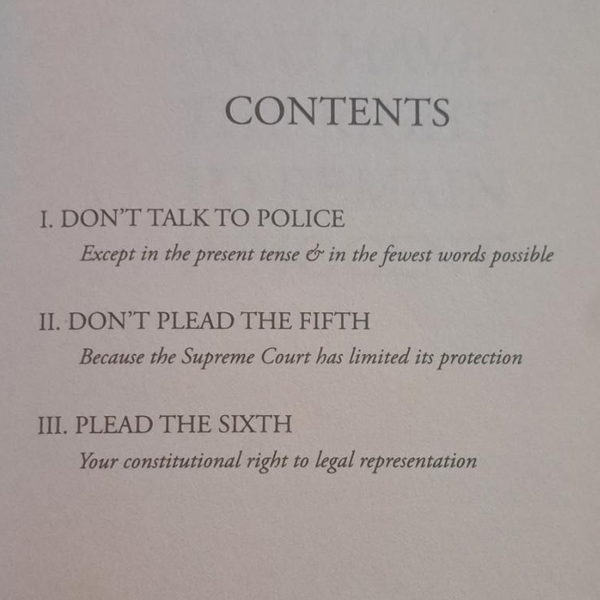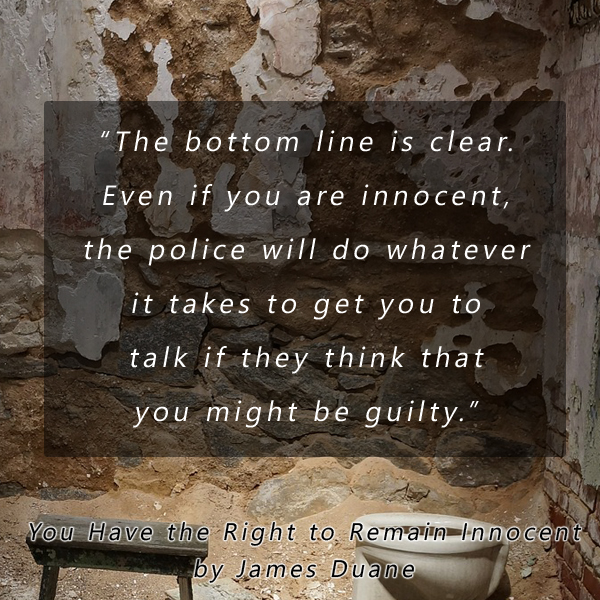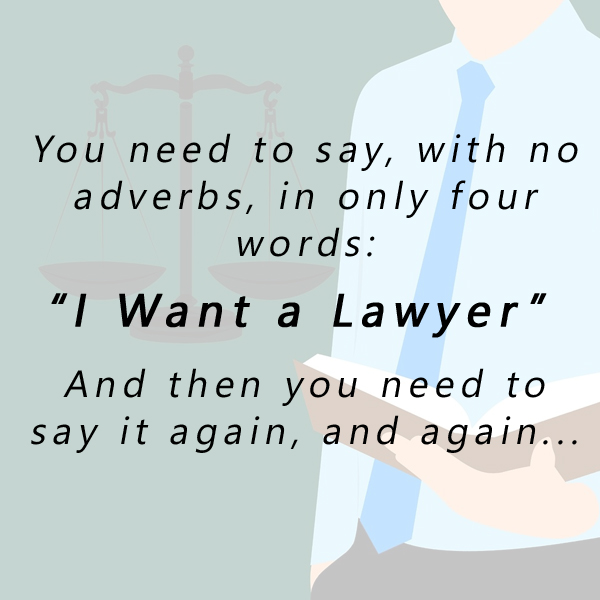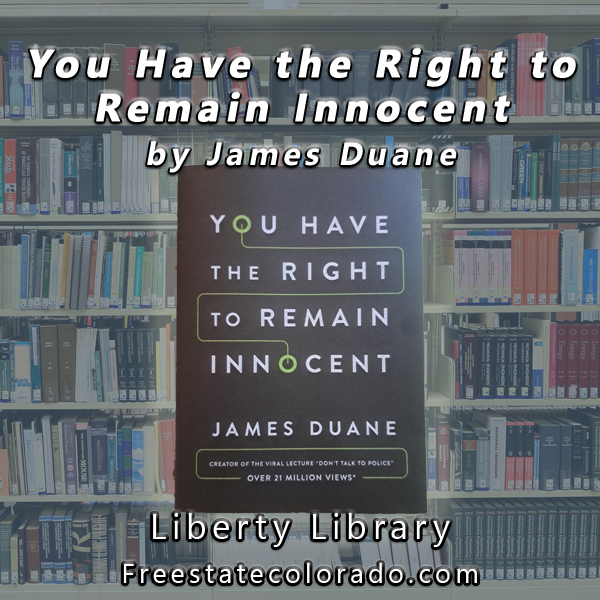The average law-abiding person wants to trust law enforcement.
They want to believe the law is on their side, and that district attorneys and police seek justice at all costs.
Unfortunately, this view of the justice system is naive and dangerous.
Misunderstanding the nature of the State could lead an innocent person to put themselves, a friend, or a family member at risk of false imprisonment.
While many police and prosecutors want justice, the legal system does not always provide it.
The recent news stories of FBI politicization have led many Americans to realize that federal law enforcement does not exist to protect all the American people.
And local law enforcement is usually no better.
This two-tiered system of justice protects the politically-connected and throws the book at average Americans.
If you don’t want to lose your freedom, you need to know how the system operates.
And James Duane’s book sets out to teach you how to remain innocent and protect yourself from the police.

“Don’t Talk to Police”
James Duane, a law professor at Regent Law School in Virginia recorded and uploaded his lecture, Don’t Talk to Police to YouTube 11 years ago.
Since then, it’s garnered over 18 million views on YouTube alone, and millions of views on other platforms.
“I’m proud to admit on camera and on the internet, I will never talk to any police officer under any circumstances.”
In his lecture and his book, Duane explains how innocent individuals have been arrested, found guilty, and served time in jail due to the information they voluntarily provided.
Many people were arrested, convicted and served time in prison only because they mistakenly thought, “I don’t have anything to hide, why not tell the police everything I know?”
Unfortunately, it’s all too easy to provide information that can incriminate you in the eyes of the law.
The Book
Published in 2016, “You Have the Right to Remain Innocent,” is a quick read at only 137 pages.
The book is outlined in three sections:
I. Don’t Talk to Police
II. Don’t Plead the Fifth
III. Plead the Sixth

In the first section, Duane gives numerous examples of Americans who were locked up, only because they chose to speak with the police.
Whether you are guilty or innocent, all it takes is one misspoken word for a law enforcement officer to convince himself that you did the crime.
“If you give the police information that turns out to be inaccurate, and the police mistakenly believe that you were lying to them on purpose, that fact can be devastating to your defense.”
If you make a mistake, you could be considered guilty.

Not only that, but it is impossible to know if you have committed a crime in our over-criminalized society.
Federal Agencies have books of regulatory codes that expand each year with more and more complex statutes.
“It has been estimated that there are tens of thousands of these obscure regulations, any one of which could potentially subject you to criminal prosecution.”
You could admit to violating some little-known law without even knowing you did anything wrong.
Duane’s stories of wrongly convicted individuals will help you realize just how easy it is for police to believe you are guilty.
Section II, Don’t Plead the Fifth discusses how Fifth Amendment protections do not help a person who hasn’t been arrested, but is being interrogated.
The Supreme Court, in the Salinas v. Texas decision ruled that “silence was admissible against him as evidence of his guilt.”
Fortunately, the Court provided some guidance for the accused: “He might have won the case if instead he had spoken up and told the police that he did not want to incriminate himself.”
Duane continues:
Criminal Suspects now have – for the first time in American history – a new reason why they must not simply remain mute when they are questioned by the police. If you simply say nothing in the face of police questions, unless you are in custody and under arrest, your silence can and will be used against you as evidence of your supposed guilt in the court of law. To avoid that possibility, you must speak up and specifically tell the police about your desire to assert your constitutional rights.
Page 96, You Have the Right to Remain Innocent by James Duane
Although, it seems nuanced, Duane clearly explains “rules you must observe about what you should say, and what you must not say,” when dealing with police:
- You Must Explicitly Invoke your Constitutional Rights
- You Must Not Tell a Lie
- Don’t Plead the Fifth
In Section III, Plead the Sixth, Duane explains what you should do if questioned by police, “tell the police that you want a lawyer.”

A Valuable Book
This book could keep you or a family member out of jail.
This book is small enough, that it makes a perfect gift for someone going off to college, or even a teenager who just got their driver’s license.
Their are countless headlines about the Justice System being weaponized against liberty-minded individuals.
Or even just an innocent bystander who quickly became the leading suspect of a crime.
If you are brave enough to speak out, and stand up for your rights, then you might become a target.
Or if you have an ex-lover or bitter business rival, you might be targeted.
All it takes is an anonymous tip to send the police to your doorstep.
Intimidation tactics are used by many in the political world to shut down activists.
Even moms who spoke out against school boards were considered “terrorist threats,” by the Department of Justice.
But you cannot live your life in fear, and you cannot give up the fight for liberty.
Don’t forget that you have rights, guaranteed under law.
But, you must learn how to navigate a police encounter and make sure those around you know what to do as well.
So, read this book and pass it along to those in your community.
You might just save a life.
What do you think? Leave a Reply Below!
Get the Free State Colorado Email Newsletter:
Follow on Telegram: t.me/FreeStateColorado
Follow on Twitter: twitter.com/FreeStateColor1




Recent Comments